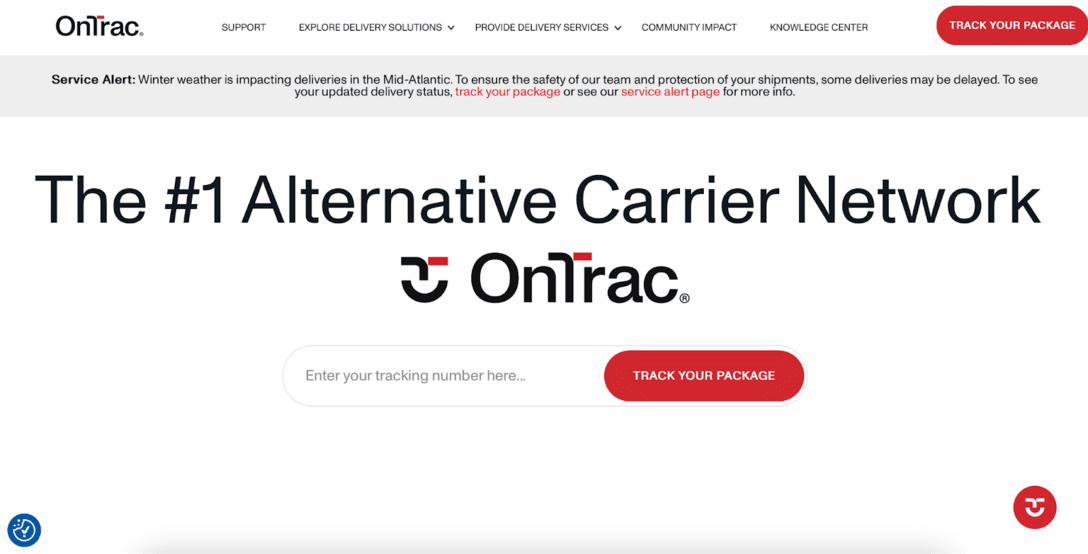Is Guardio a Scam?
Laura Martisiute
Reading time: 7 minutes
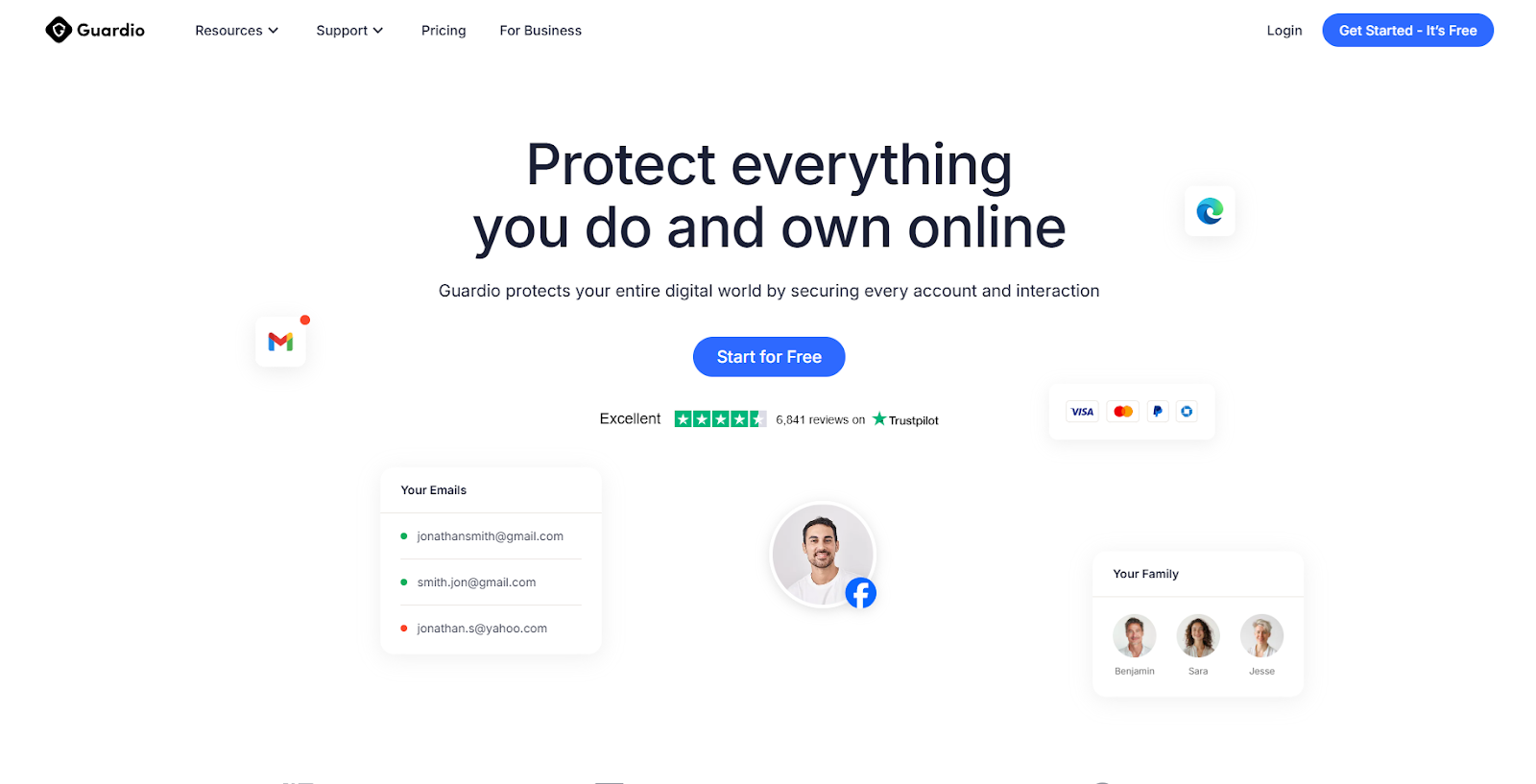
Table of Contents
If you’re thinking of using Guardio, you need to know: Is Guardio a scam?
Below, we explain whether Guardio is a scam and discuss some steps you can take to improve your safety when using this browser extension.
What Is Guardio?
Guardio is a browser extension that provides protection against online threats.
These threats include:
- Harmful sites and scam web pages.
- Data breaches (for which Guardio sends alerts).
- Unwanted and malicious notifications.
- Malicious extensions.
- Potentially dangerous text messages.
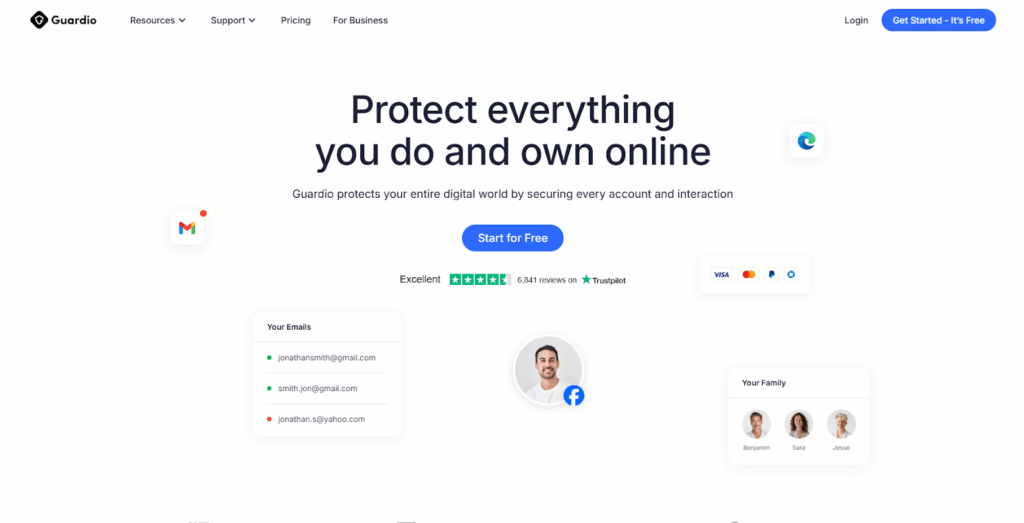
When you install Guardio, it scans every site you visit.
Guardio is a paid browser extension. However, you can try it for free with a 7-day trial period before committing to a purchase.
Depending on which Guardio plan you choose, you may also be covered for up to $1 million in the event of identity theft.
The extension works within Chrome and Chromium browsers and is available on desktop computers and mobile devices.
Is Guardio a Scam?
No, Guardio is not a scam. It’s a legitimate online tool to protect your online identity.
It gets mostly positive reviews from both third-party review sites and users.
For example, the publication PCMag gives Guardio a rating of 3.5 out of 5.0 stars (“Good”).
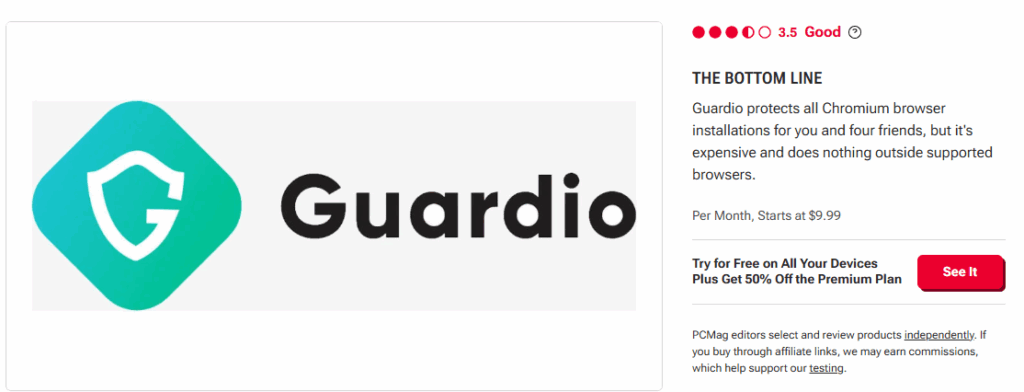
According to PCMag reviewer Neil J. Rubenking, “Guardio protects all Chromium browser installations for you and four friends, but it’s expensive and does nothing outside supported browsers.”
TechRadar gives Guardio a rating of 4.0 out of 5.0 stars. Their conclusion? “Slightly overprotective Chrome extension with some superb features.”

Users mostly report positive experiences:
- 4.3 out of 5.0 stars (from 6,830 reviews) on Trustpilot.
- 4.1 out of 5.0 stars (from 5,312 reviews) on Google Play.
- 4.6 out of 5.0 stars (from 3,007 reviews) on the App Store.
- 4.5 out of 5.0 stars (from 47 reviews) on Capterra.
- 1.6 out of 5.0 stars (from 163 reviews) on Pissed Consumer.
The overall user sentiment on review sites is positive.
Users praise Guardio for spotting and blocking malicious websites, phishing attempts, scam emails, and harmful Chrome extensions.
Many appreciate the immediate notifications about suspicious activity, especially via email or browser.
However, several people complained about being charged even after canceling their trial membership.
Guardio requires credit card details when you sign up for a trial to prevent fraud and ensure a smooth transition after the trial.
Per Guardio’s terms of service, subscriptions auto-renew unless canceled.
The company states that a hold is placed on your credit card for the trial amount, but it is not charged. If you decide not to use Guardio, the hold will be lifted, and the funds will be returned to your account.

As far as we could see, Guardio responded to customers complaining about being charged unfairly with instructions on how to cancel and/or reach out to their customer service.
Security
In its privacy policy, Guardio states that it “takes appropriate security measures for data security purposes” to protect your data but does not provide details on these measures.
It also says that it periodically inspects the data security of its services and performs modifications and upgrades accordingly.
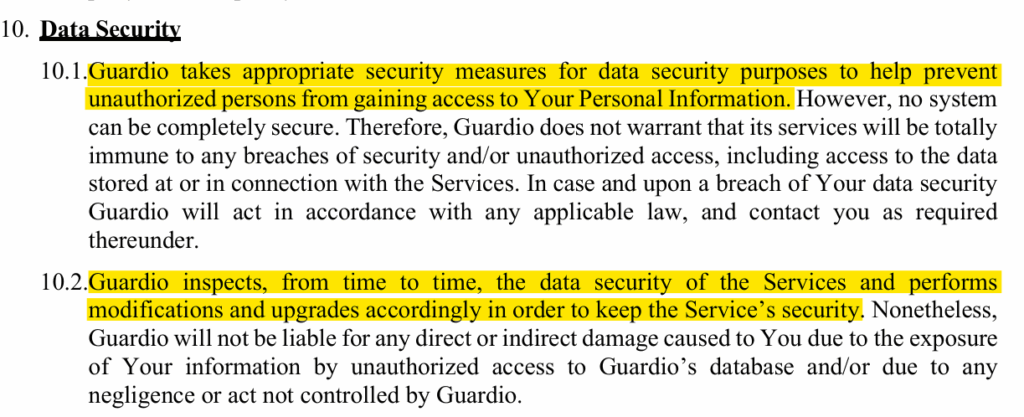
As for its services, Guardio says that it has a dedicated security team that continuously monitors new scams and vulnerabilities to protect users against them.

Privacy
Guardio explains the type of data it collects, why it collects it, and with whom it shares it in its privacy policy.
We like that it has a “Short version” of its policy for individuals who don’t have the time to read the whole document.
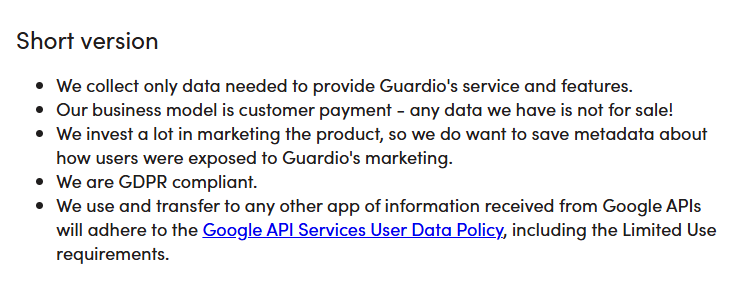
Guardio states that it only collects the information necessary to provide you with its services and features.
Specifically, Guardio collects the following personal data:
- Anonymized browser behavior.
- Country.
- IP address.
- Installation time.
- E-mail.
- Last name (as provided by you).
- 4 digits of credit card.
- Credit card type for paying customers.
- Other information provided by you during and as part of creating and maintaining a Guardio account.
- Additional information if you use Guardio’s email scanning feature and/or SMS messages scanning feature (including email and messages content).
It may also receive your information from third parties with which it cooperates, such as service providers.
Guardio uses the above information to provide and improve its services, perform research, provide statistical information to third parties, enforce its terms, collect payable fees, offer additional services and products, and for any other purposes as described in its terms of service or privacy policy.
Additionally, it may use your data for marketing and advertising purposes, communication, and internal use (e.g., investigating complaints).
As per its terms of service, when you register with Guardio, you consent to receive communications about updates, improvements, and other user notifications.
During registration, you are also asked to give your consent to receive marketing materials. You can opt out of receiving marketing materials by clicking the available opt-out link in any Guardio communication or by contacting Guardio directly.
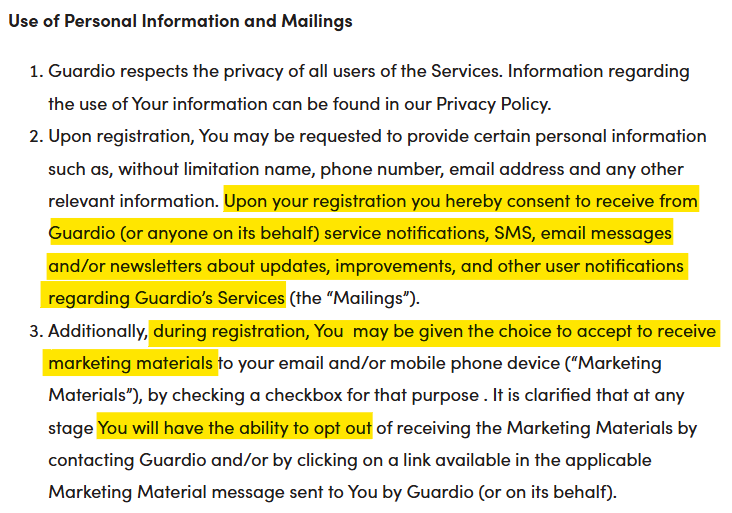
Guardio may share your information with your permission, when you violate its terms or act illegally, to enforce its terms of service, with authorized third-party service providers, in response to a subpoena or similar demand, to exercise its legal rights, to defend against legal claims, to collect unpaid fees, and in connection with a substantial corporate transaction.
In its terms of service, it also says that it may offer access to third-party identity theft protection, insurance, and restoration services. These are governed by separate terms and privacy policies from the insurance provider. Guardio shares your data with these providers as needed.
As it says in the TL;DR version of its privacy policy, Guardio does not sell user data. Its business model is based on user subscriptions.
The company says it will retain your information only “for as long as necessary to fulfill the purposes it was collected for” but does not provide specific timeframes.
Depending on where you reside, you may be able to exercise privacy rights, like the right to access your personal information and the right to instruct it to cease the processing of your personal information.
So, Should You Use Guardio?
Probably.
Guardio is good at providing immediate notifications about risky websites, suspicious emails, and malicious browser extensions. It reportedly runs quietly in the background and doesn’t slow down your browser.
How to Use Guardio Safely and Privately
- Download Guardio from official sources only. Download the extension from the official Guardio website or the Chrome Web Store. Avoid using third-party download sites, as they may offer malicious versions.
- Create a strong password for your Guardio account. And don’t reuse it elsewhere on the web.
- Opt out of marketing communications. During signup, uncheck marketing boxes or unsubscribe later via email footer links or by emailing Guardio.
- Don’t rely on Guardio only. Instead, combine Guardio with an antivirus (for device-level protection), VPN (for hiding IP and encrypting internet traffic), and 2FA (Two-Factor Authentication) on sensitive accounts.
- Be cautious with identity theft services. If you use Guardio’s identity theft insurance, read the terms from the third-party insurer and know what personal data Guardio shares with them.
- Exercise your privacy rights. Depending on where you live, you may be able to exercise privacy rights like the right to see what data Guardio has about you, correct it, or ask it to cease processing your information. You can exercise your rights by emailing my.privacy@guard.io.
Our privacy advisors:
- Continuously find and remove your sensitive data online
- Stop companies from selling your data – all year long
- Have removed 35M+ records
of personal data from the web
Save 10% on any individual and
family privacy plan
with code: BLOG10
news?
Don’t have the time?
DeleteMe is our premium privacy service that removes you from more than 750 data brokers like Whitepages, Spokeo, BeenVerified, plus many more.
Save 10% on DeleteMe when you use the code BLOG10.



